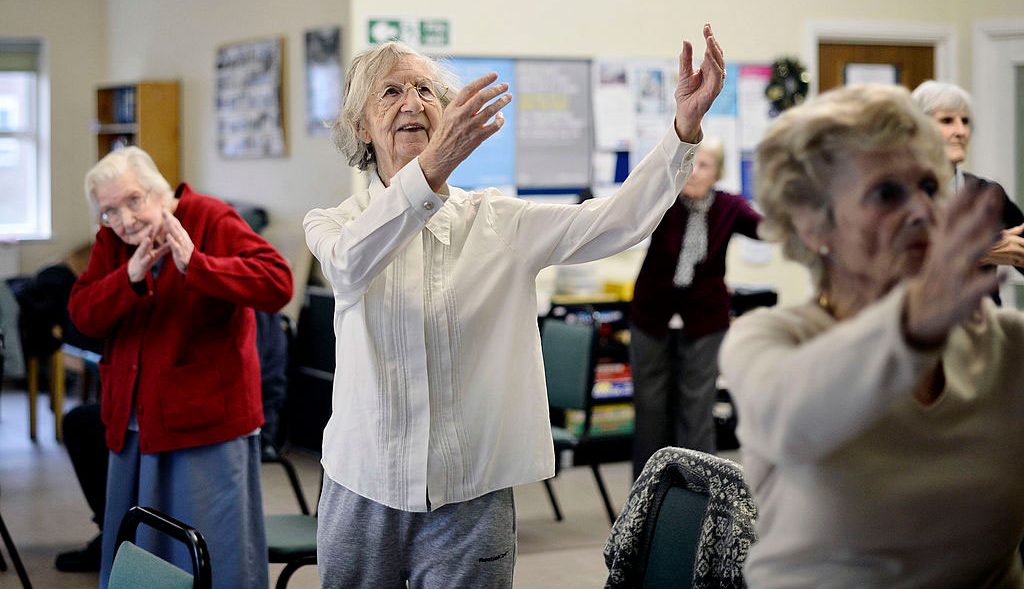Tai Chi Lowers Blood Pressure in Older Adults

An ancient mind and body exercise can treat high blood pressure.
Several factors raise the risk of high blood pressure (also known as hypertension), including being overweight, smoking, consuming too much alcohol, lack of exercise, and a family history of the problem. Simply getting older adds to the likelihood of developing the condition, too. In fact, about 65 percent of Americans who are 60 or older have high blood pressure, according to the National Heart, Lung and Blood Institute (NHLBI)
Over time, hypertension can contribute to heart disease, strokes, and other serious health problems. However, blood pressure that is out of the healthy range (higher than 120/80) can usually be lowered with aerobic exercise, weight loss, a salt restricted diet and, if needed, medication. And now researchers have found another way to treat high blood pressure — tai chi.
YOU MIGHT ALSO LIKE: Yoga for Seniors
This ancient mind and body practice involves moving through a series of postures and gentle, flowing body movements while concentrating on calm, slow breathing and relaxation. To see if tai chi has an impact on blood pressure in older adults, Linda Pescatello, PhD, professor of kinesiology at the University of Connecticut, analyzed 28 studies involving almost 1,300 people with an average age of about 62 who practiced tai chi and 919 people the same age who didn’t exercise.
On average, those in the tai chi groups performed the slow movements two to three times a week for about an hour each session. After a little more than three months, the elders practicing tai chi had substantial drops in blood pressure. For those who practiced tai chi more than three times a week, the average blood pressure reduction was even more dramatic.
Pescatello, who presented the research findings at the American College of Sports Medicine’s 2016 meeting, noted the reduction in blood pressure experienced by the older people who practiced tai chi was comparable to the lowering of blood pressure with prescription medications or aerobic exercise. This suggests tai chi may be an important antihypertensive therapy for people who can’t tolerate the side effects of drugs used to treat high blood pressure.
Exactly how tai chi lowers blood pressure isn’t known, but Pescatello and her colleague, University of Connecticut kinesiology graduate student Yin Wu, think it may be due to stress reduction. The centuries old form of gentle exercise may also has a positive effect on the autonomic nervous system, which controls involuntary bodily functions, including heart rate and blood pressure, the researchers added.
Because it’s a low intensity exercise, tai chi may be especially attractive to older adults who aren’t interested in — or capable of — strenuous workouts at the gym. It’s often performed alongside several other people, offering elders a social activity, too, Pescatello pointed out.
Previous studies have found tai chi has several other potential health benefits, according to the National Center for Complementary and Integrative Health (NCCIH). For example, practicing tai chi improves balance and stability in older people and those diagnosed with Parkinson’s disease. It also can reduce pain from osteoarthritis in the knees, help people cope with fibromyalgia, and back pain, and promote a better quality of life and improved mood in those with serious health problems, such as heart failure and cancer.
If you or someone you know is interested in learning tai chi, the NCCIH explains it’s not a form of exercise you can easily learn from a book or video. Instead, ask your doctor or another trusted healthcare source to recommend an experienced tai chi instructor so you can learn the movements safely and correctly. The NCCIH website offers in depth information on tai chi and a related mind and body practice, qi gong.
Updated:
April 07, 2020
Reviewed By:
Janet O’Dell, RN